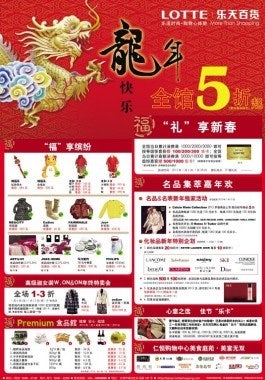Lotte Department Store Ran First Advertisement In Chinese Newspapers This Month#

They come to shop, regularly outspend other foreign tourists, are arriving in record numbers, and have their eyes on a holiday in Korea: China's outbound travelers, more of whom are going abroad to celebrate Chinese New Year in 2012. With mainland Chinese tourists becoming some of their best foreign customers in recent years, unseating the formerly dominant Japanese, this year we're seeing South Korean department stores and malls pull out all the stops to attract more Chinese shoppers, ranging from advertising in China's state-run People's Daily newspaper for the first time to offering special discounts for Chinese New Year travelers. The trend of expending greater effort in luring in Chinese tourist-shoppers is far from overkill, though: over the course of the Chinese New Year holiday (January 22-28), the Korea Tourism Organization (KTO) expects at least 45,000 Chinese tourist arrivals, a rise of 35 percent over last year.
This month alone, the KTO expects Chinese travelers to spend at least 60 billion won (US$52 million) using their Union Pay credit cards, and around 100 billion won ($88 million) total, including cash. In preparation for this influx, the KTO and a slew of major retailers in Seoul have a number of events and promotions planned for Chinese New Year. From the Korea Herald:
“As 2012 marks the 20th anniversary of Korea-China diplomatic ties, we are anticipating some 3.4 million people from China to visit the country this year,” said Han Hwa-joon, head of the KTO’s China bureau.
Chinese tourists have taken up the largest share of the Korean tourism sector over the past few years, largely due to the growing interest in Korean culture in China and the growth of the country’s economy.
Some 2.2 million Chinese came to Korea last year, spending up to 13 trillion won on high-end products including cosmetics, jewelry, designer-brand bags, watches and clothing, according to data by local market researcher Bain & Company.
In a separate survey taken by Korea Chamber of Commerce and Industry last year of some 300 major stores and duty free shops in Korea, nearly 60 percent answered that Chinese travelers have “stronger spending tendency” than people from Europe, Japan and elsewhere.
Following the lead of retailers in London, Las Vegas, New York and elsewhere who have recorded stronger sales from mainland Chinese tourists since adding UnionPay consoles, the KTO has heavily promoted new discounts for tourists using UnionPay credit cards. Cardholders who use their plastic at stores in Myeong-dong, Jeju Island and other destinations will receive special discounts and bonus points. This effort comes alongside the KTO's much-hyped "2012 Korea Grand Sale," which gives foreign tourists special discounts in shopping, accommodation and transportation. Next month, Korea will make further overtures to the China market with the launch of its "Visit Korea Year" ceremony and road show, which will promote tourism to Korea in 18 major Chinese cities.
Interestingly enough, rather than expense or travel difficulties, what seems to be holding back more Chinese tourists from visiting Korea is a shortage of hotel rooms. As the Korea Herald notes:
According to a study on seven major hotels and resorts in Gyeonggi Province by the Gyeonggi Tourism Organization, some 8,700 Chinese travelers have already made reservations, which is almost three times the number of last year. Adjacent to Seoul and Incheon International Airport, the region has been seeing a large growth in travelers after Seoul.
Major hotels and resorts in Gangwon Province and Jeju Island, also popular among Chinese tourists, also have more than 90 percent of their rooms booked with 21,600 and 17,000 reservations made, respectively.
In a survey conducted in October last year, major travel agencies in China said they could draw hundreds of thousands more to visit Korea “should Korea secure more rooms” to accommodate them, according to the KTO.
